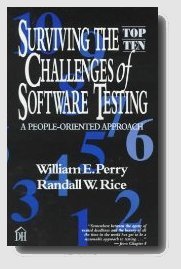2 Days
"As usual, Randy's presentation gives me the motivation to go back and try to affect change at my company. The information he gives has a high usability rate." - Ann Clarke
"I would definitely recommend or attend another one of his (Randy's) courses." - Michael Zehring
This two-day session is designed for test leaders and test managers, people who expect to be in a test leadership role, or people who lead other test managers and test leaders. The main objective of this session is to teach you how to be the very best test manager and leader. This course also answers the question, "What does it mean to be the best?"
There are many people functioning as test managers, but how many are really leading the team? In leading a test team, you must not only understand the basics of software testing, but you must also understand your own organizational culture. Once you understand your organizational culture, you might find that testers have a less than positive image. This session will discuss how to transform the image of testers from one of police to one of team members.
You will learn the terminology, process, and challenges of testing in the real world. Team-based exercises reinforce the concepts of facilitating team activities and performing leadership activities.
As a result of attending this seminar, you should have a good working knowledge of software testing and what it takes to design and conduct an effective test of software, regardless of the technology.
Becoming an Effective Test Team Leader will help you become more comfortable and confident in leading the testing effort in your organization. You will emerge from this two-day session knowing how to develop test cases and test plans. You will also leave with a knowledge of how tools can help you perform testing.
Sometimes people feel intimidated by the technical aspects of software testing and lack the confidence they need to be credible test leaders in their organization. Learn the issues and processes for effectively testing software by attending this hands-on course.
-
Learn how to find costly and embarrassing problems before your customers find them.
-
Understand the key issues in testing software applications.
-
Learn how to deal with people issues that can easily derail your project.
-
Get the most out of your existing investment in testing and how to leverage that investment.
-
Advance your career by reinforcing your testing expertise.
-
QA and Test Managers
-
Aspiring QA and Test Managers
This course requires basic testing knowledge or experience. Extensive technical knowledge is not a prerequisite.
Program Information
This course is presented on an in-house basis only unless offered as a special public course. Contact us for information about how to bring this course into your organization.
Module 1 - Assessing Your Needs
This module is a self-assessment that examines two critical aspects of test leadership:
-
Assessing the People Issues
-
Assessing Your Core Testing Competencies
Module 2 - Addressing the People Issues in Testing
This module explains the most common problems encountered in software testing and proposes solutions to the problems.
-
What Tests You?
-
Understanding the Two Conflicting Roles of a Tester
-
The Top Ten Challenges of Software Testing
-
Solutions to the Challenges
Module 3 - Principles of Leadership
This module examines the principles of leadership in general and what it takes to be an effective leader of people.
-
What Makes a Good Leader?
-
Leadership vs. Management
-
What Does It Take To Be The Best In Leading A Test Team?
-
Principles Of Effective Leadership
Module 4 - Building Core Testing Competencies
This topic addresses the basic knowledge that a tester needs to have to do an effective job and how to build those core competencies.
-
What are Core Testing Competencies?
-
Identifying Core Testing Competencies
-
Assessing Your Core Testing Competencies
-
How to Lead Your Team in Building their Core Competencies
Module 5 - Selling Testing to Management
This module describes how to get your message across to management.
-
Why Management Doesn't Understand Testing
-
Finding the Hot Buttons
-
Identifying the Stakeholders
-
Timeless Principles of Marketing and How They Can be Used to Market Testing
-
Getting the Story Across: How to Make a Great Presentation
Module 6 - Building an Effective Test Team
This module addresses how to hire, train and keep people for your test team.
-
Recruiting the Best People
-
What to Look for in a Tester
-
Keeping the Best People
-
Building and Training the Test Team
Module 7 - Leading by Process
This module describes why processes are so important and how to develop your own testing processes.
-
The Role of Process in Effective Testing
-
What is Process Maturity and How Does it Impact Testing?
-
What are the Stages of Test Process Maturity?
-
How to Define a Process in About an Hour: The Workbench Approach
-
Where do Standards Fit in?
-
How to Assess your Test Process Maturity
Module 8 - Metrics and Measurement
This module explores how to measure your testing effectiveness.
-
What are the Most Effective Measurements and Metrics for Testing?
-
What are Function Points?
-
Benefits of Testing Metrics and Measurements
-
What Needs to be in Place to Capture Measurements and Metrics
-
Tools and Techniques for Measuring Testing Activities
-
Tracking and Understanding Defect Trends
Module 9 - Knowing What’s Important: Risk Assessment
This module explores the nature of risk and how to assess the level of relative risk for the purpose of test planning.
-
What is Risk?
-
Why is Risk Assessment Important?
-
The Elements of Software Risk
-
An Informal Risk Assessment Process
-
A More Formal Risk Assessment Process
Module 10 - The Role of Test Automation
This module examines the role of automated tools in testing and provides a process for selecting the right tools for your project.
-
The Role of Test Tools
-
The Risks of Not Automating Testing
-
The Risks of Automating Testing
-
Test Automation vs. Manual testing
-
Tips for Automated Testing
-
The Major Issues
-
Top Ten Test Tools
-
Capture/Playback
-
Steps in Selecting a Test Tool
-
Critical Success Factors
Module 11 - Project Management Considerations
This module addresses basic project management concerns and how they relate to testing.
-
Keeping the Test on Track
-
Keeping Control When Others Want to Drive
-
How to Estimate Test Time
-
How to Track Progress
-
The Role of a Defect Administrator
Module 12 - Working and Playing Well With Others
This module address the cultural aspects of a project and how they relate to testing.
-
The Role of Testing in a Project
-
Working with Developers
-
Working with Users
-
Keeping Management Informed of Progress
-
Managing Expectations
-
What Can a Tester Reasonably Assess or Recommend?
Module 13 - Summary
This is a summary of the workshop.
-
Top Ten Seminar Points
-
Final Thoughts
-
Questions and Answers
Resources
-
Checklists and Templates
-
Glossary
-
Course notebook with slides, worksheets, checklists, complete examples and supporting text
-
You will have the information needed to be an effective test team leader.


